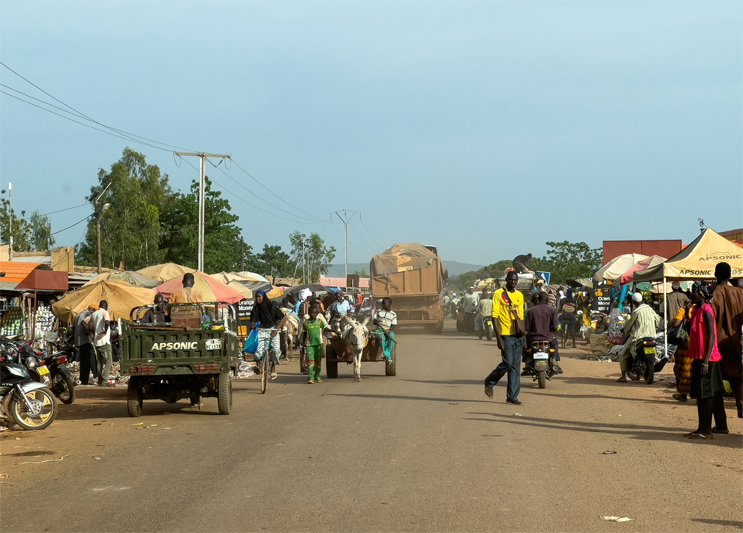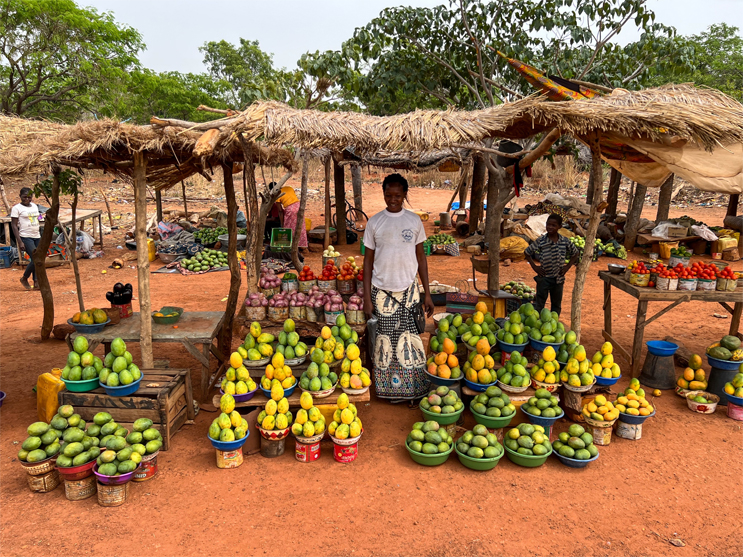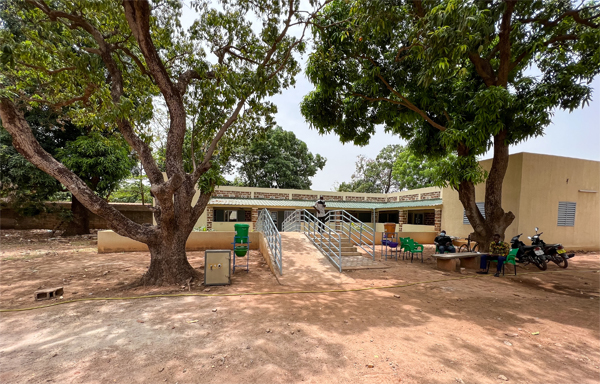A Firsthand Experience In Africa — Sub-Sahara Has A Lot To Offer
By Kamila Novak, KAN Consulting
 In my previous article “Better Than Expected — A Firsthand Experience In Africa,” I shared my positive impressions from visiting medical research centers in sub-Saharan Africa. However, we would not have the full picture without talking about the continent’s personal safety and professional security, regulatory landscape, and ongoing socioeconomic challenges.
In my previous article “Better Than Expected — A Firsthand Experience In Africa,” I shared my positive impressions from visiting medical research centers in sub-Saharan Africa. However, we would not have the full picture without talking about the continent’s personal safety and professional security, regulatory landscape, and ongoing socioeconomic challenges.

A road between Dande and Bobo-Dioulasso, Burkina Faso. Credit: Kamila Novak.
Professional Security & Personal Safety Proved A Non-Issue
One of the things I immediately noticed was tight security in most places. Even private houses, except for those in poor neighborhoods, have high walls with barbed wire or broken glass on the top, as well as CCTV cameras. Bars on doors and windows are common and so are private security guards.
Some research centers resemble fortresses. Entrances have security scans and detectors; in one center, all technical equipment carried by guests, e.g., tablet, phone, and laptop, were recorded and accounted for upon departure. The measures are direct responses to past attacks by various militias, paramilitary groups, and terrorists.
Despite those formidable measures, I felt safe. I travelled alone, used random taxis, and walked around taking pictures. People were friendly and, often, curious, walking alongside me for small talk. Unlike in some other countries I have visited, nobody begged or pushed me to buy something; Africans treated me as any other passerby. Many people are very poor, but nobody was complaining. And people of various beliefs live together peacefully.
Regulatory Harmonization Has Brought Millions In Funding
All of the countries I visited in Africa follow clinical study regulations and are bound by approving bodies. Regulations clearly describe the submission requirements, mandatory documents to be included in applications, and periodic and ad-hoc safety reporting requirements. Most research centers have established their own Institutional Review Boards (IRBs), even if not required by regulations, and researchers are regularly trained in GCP and other good practices.
The countries have established privacy laws or are close to having them approved by their governments. The regulators pay close attention to safe and secure disposition of unused investigational products after study end. A request for authorization must be submitted to a specific regulatory authority department that will determine the appropriate method of destruction. The destruction itself is performed by the given research center’s licensed pharmacist and witnessed by the authority representatives as well as representatives of the environmental protection authority, local communities, and the police. The destruction is documented, and the regulatory authority issues a certificate of destruction.
The harmonization efforts in Africa have been successful. The African Union adopted the Treaty for the Establishment of the African Medicines Agency (AMA) on Feb. 11, 2019, and it became law on June 22, 2021.[1] The International Federation of Pharmaceutical Manufacturers and Associations [2] immediately recognized the AMA and welcomed completion of the decade-long harmonization journey. On Feb. 15, 2022, the European Union, several EU Member States, and the Bill and Melinda Gates Foundation announced mobilization of more than 100 million euros over the next five years to support the AMA and other African medicines regulatory initiatives at regional and national levels. [3]
In addition to pan-African efforts, the East African Community (EAC) and the Economic Community of West African States (ECOWAS) established joint assessment procedures (JAP). The EAC’s marketing authorization (MA) timeline fell from 24 months to 8 to 14 months through the JAP, which aims to reduce duplication of cost and effort and promote more efficient use of resources through implementation of a common approach in assessment of safety, efficacy, and quality of medical products by pharmaceutical industries and national medicines regulatory authorities (NMRA). [4]
The Pan-African Clinical Trial Registry (PACTR), established in 2008, is the first WHO-recognized clinical trial registry in Africa. The PACTR aims to be a comprehensive database of planned, ongoing, and completed clinical trials in Africa, providing accessible information about the scope, location, ethics, and funding patterns of trials conducted across Africa.[5] Study registration is free of charge.

Rural residents make their living selling products along a main road in Burkina Faso. Credit: Kamila Novak.
Socioeconomic Challenges Still Pervade
Of course, there are challenges. The most prominent ones include access to education and healthcare, especially in West and Central Africa, and access to funding in all countries.
In rural areas of Burkina Faso, most people are illiterate and speak only local languages. To consent study participants, the researchers need to find witnesses who are literate and fluent in both the participant’s language and French, since the informed consents are typically in French. It would be next to impossible to translate consent forms into the roughly 70 languages spoken in this small country.
Digital communication can also be troublesome. Internet connection was a challenge during my trips. In many places, I had no or painfully slow connections, and sometimes even no phone signal. Satellite internet is still very expensive, so I gave up on that option. Of course, the research centers found solutions. When feasible, they sign contracts with government internet providers; this is the only support from the governments, which otherwise do not support the centers financially. The centers do not rely on one provider but typically contract a few more as a backup.
Centers in rural areas do not have this option but found another solution: small portable devices with SIM cards providing Wi-Fi with quite a good connection speed. However, the user must be a citizen with a local address and obtain a special governmental permit to purchase it. It does not work abroad, even if the SIM card is replaced with another one. If none of these options works, the field workers record data in their study tablets using the offline mode, and then synchronize once they return to the center.
Lastly, limited access to funding results in a piecemeal approach to improving infrastructure, especially research centers’ archives, while the climate presents risks of a rapid deterioration of documents. Using huge, retired transportation containers is a clever solution; nevertheless, the container still needs air conditioning and working lights, which means a power supply as well, plus pest control, temperature and humidity detectors, fire alarms, suitable fire extinguishing, and a desk for the archivist, apart from a roof above to improve protection during rainy seasons and a sufficiently large secure area in which to place the containers.

Newly renovated field satellite site in Banfora, Burkina Faso. Credit: Kamila Novak.
Africa Has A Lot To Offer
The West can offer a lot in terms of technology, advanced research methodologies, the latest experience, and support for harmonization processes. Nevertheless, Africa has its own upsides.
From African researchers, we can learn a deep respect for study participants, responsibility to local communities and their engagement, a balance of perseverance and resourcefulness, and a “no complaints” attitude. I am not saying these qualities do not exist in the West; however, I have not seen them anywhere else so strong as in Africa.
I am deeply thankful for the African experience. I have seen what people of modest means can do with limited resources when they are determined, dedicated, and patient. I used the audit opportunity to advise, but I also found new friends and filled my treasury with great memories. I hope to return and help build capacity for a better tomorrow.
References
- African Union website, https://au.int/en/treaties/treaty-establishment-african-medicines-agency
- IFPMA website, https://www.ifpma.org/subtopics/african-medicines-agency/
- DIA Global Forum, Feb 2022, https://globalforum.diaglobal.org/issue/july-2022/eu-mobilizes-cooperation-with-the-african-medicines-agency/?utm_source=db&utm_medium=email&utm_campaign=global_forum&utm_content=PUB_GF_
July_2022-07-09_Twilio&mkt_tok=MzQ5LVNWSi0wNjgAAAGFf9_bWXpcQzxwZ_8qiA7qMVsKpZJIq-6YifhxsRWB-uTGgnf6_NFntU7JPcWzfdGl0_3rH0m4qDxs8bpApYq9dxmYBKaEnN7Mih1y9rvNwhI - DIA Global Forum, Feb 2022, https://globalforum.diaglobal.org/issue/february-2022/assessment-of-regulatory-submissions-in-east-africa-and-west-africa/?utm_source=db&utm_medium=email&utm_campaign=global_forum&utm_content=PUB_GF_
February_2022-02-05&mkt_tok=MzQ5LVNWSi0wNjgAAAGCZx7etEfD_nlBltqgbe9CKrCV7YSVKyx5B8v1z5za49Kv
ap0yMWeyL_6g82jly2_w-y_-UOLPuCCFN7YLiUD68f41oGqz9rVRBtdh166_qAY - PACTR website, https://www.edctp.org/pan-african-clinical-trials-registry/#
About The Author:
Kamila Novak, MSc, got her degree in molecular genetics. Since 1995, she has been involved in clinical research in various positions in pharma and CROs. Since 2010, she has been working as an independent consultant focusing on QA &QC being a certified auditor for several ISO standards, risk management, medical writing, and training. She is a member of the Society of Quality Assurance (SQA), the World Medical Device Organisation (WMDO), the European Medical Writers’ Association (EMWA), the Drug Information Association (DIA), the Continuing Professional Development (CPD) UK, and other professional societies.
